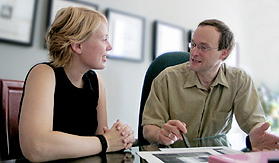From the Ask Tom mailbag –
Question:
You suggest ten questions regarding each Key Result Area with 2 drill down questions. As an example, you suggest 150 questions would be reasonable.
How do you handle that practically. If you ask a candidate 150 questions and give two minutes per question for response, you are looking at 300 minutes for an interview (5 hours, not counting breaks).
Maybe for an executive position such a marathon interview process could be done but it seems difficult with several candidates to have interviews of such length. Is this practical or am I missing something?
Response:
You are not missing anything, you are just used to giving candidates two minutes to make up stuff, inflate their experience, exaggerate about skills and generally waste your time.
In preparation for the interview, I identify a number of Key Result Areas (KRAs). In each KRA, I have identify tasks, activities, accountabilities and the level of work. I need to know some very specific information about the candidate.
For example.
I am interviewing for a dispatcher role for a fleet based service company, with thirty trucks on the road. Each afternoon, my dispatcher reviews all the leftover work and makes sure it gets on the following morning schedule. In spite of the schedule, fifty percent of those service calls will get re-scheduled during the day. During the day, an additional 90 service calls will get added to the mix. Our target turnaround time for all service calls to be completed is 24 hours.
Here is a partial list of questions I might ask.
- In your former position, as a dispatcher, how many service vehicles in your fleet?
- What was the geographic range for your entire fleet?
- What was the geographic range for a single vehicle?
- How many service calls did each vehicle take per day?
- What was the target turnaround time from the time of the customer call to the customer’s home?
- What was the length of each service call?
- How many service calls each day had to be re-scheduled?
- What were the primary reasons for service calls to be rescheduled?
- At the end of the day, how many service calls would be left over?
- How were those left-over service calls scheduled for the following day?
- What dispatch software did you use?
- Step me through a customer call, how was it scheduled in the software?
- How did you know when a call was completed?
- Were customer satisfaction calls made after the service call?
- Who made the customer satisfaction calls?
- Step me through how the customer satisfaction data was recorded?
- Step me through how the customer satisfaction data was used?
- What changes were made to the dispatch system based on the customer satisfaction data?
Does it take two minutes to answer each question? Do these questions give you insight into the exact experience level of the candidate? Can you think of additional drill-down questions you might ask during the course of this small sample?
And I am only getting warmed up.
